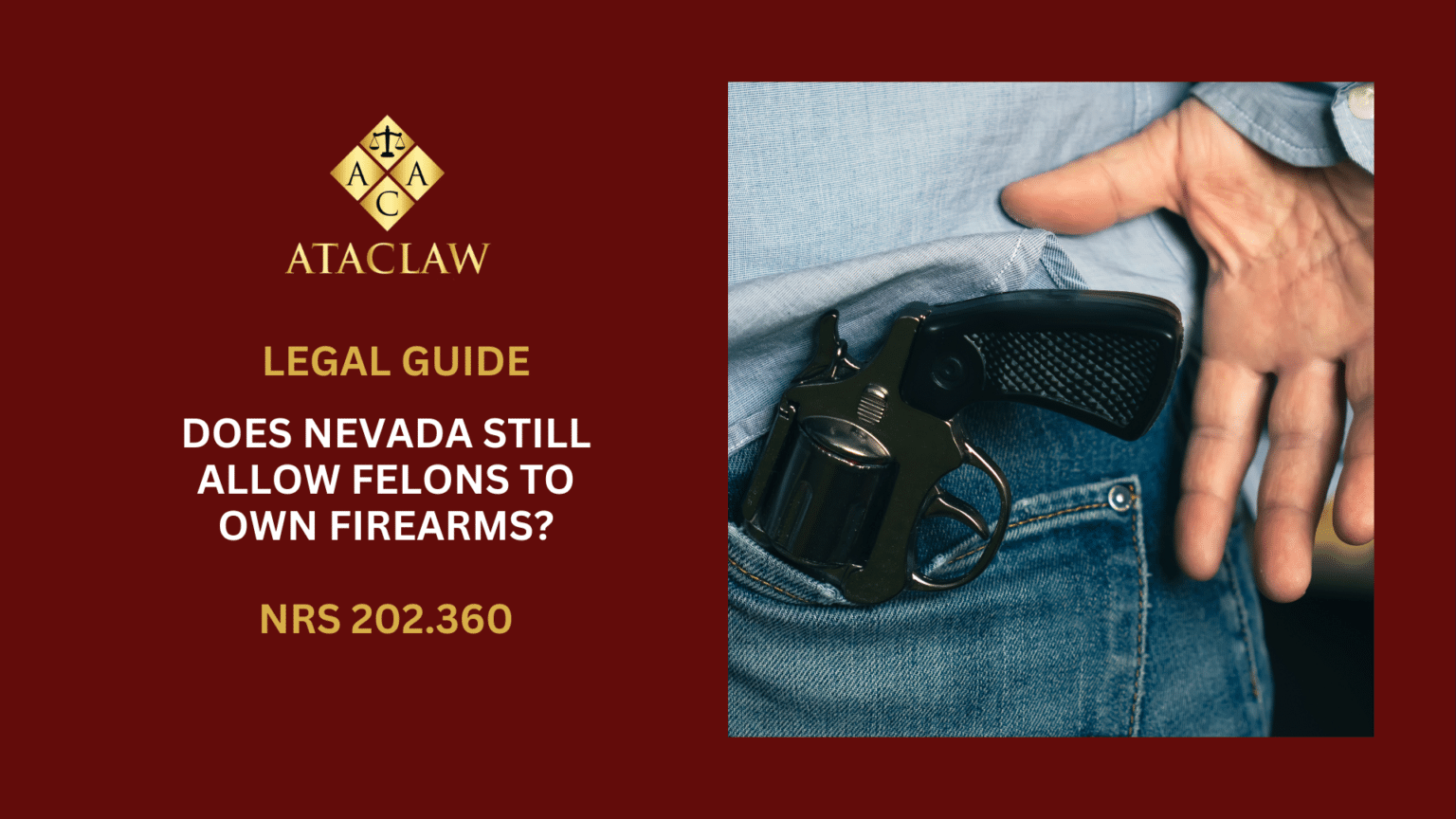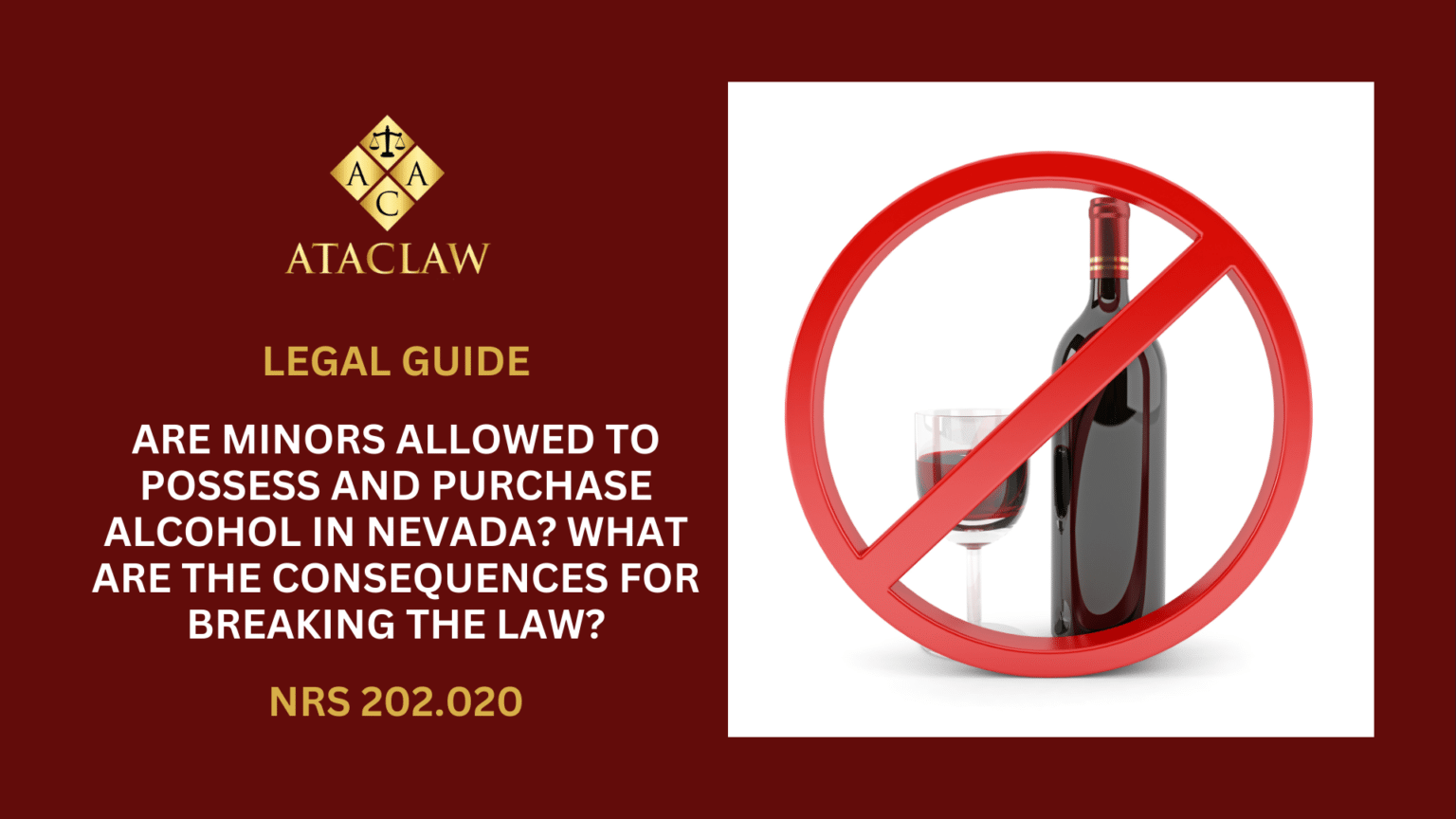In Nevada, ensuring the safety and security of its residents is paramount. One way the state achieves this is by setting strict regulations on who can legally own or possess firearms. Nevada’s approach to firearm ownership and possession is outlined in NRS 202.360. This statute clearly delineates a list of individuals who are deemed ineligible to wield the power and responsibility that come with handling firearms. Labeled commonly as “felon with a firearm” or “felon in possession of a firearm,” Nevada takes these offenses seriously. Violation of this statute can lead to severe penalties, including 1 to 6 years in prison and fines up to $5,000.
Who is Legally Forbidden from Handling Firearms in Nevada?
In the interest of public safety, Nevada enforces stringent rules under NRS 202.360 to define who can and cannot legally possess firearms within the state. ATAC LAW is here to provide an easy-to-understand overview of these laws, breaking down the complex legal language into straightforward terms.
Categories of Individuals Restricted Under NRS 202.360
Nevada’s directives cast a wide net, prohibiting a total of twelve distinct groups from owning, managing, or having any form of control over firearms:
- Felony Convicts: Anyone convicted of a felony in the U.S., barring those who’ve had their firearm rights restored through a pardon.
- Federal Prohibitions: Encompasses those barred under federal law, including those dishonorably discharged from the armed forces, those who have renounced their U.S. citizenship, among others.
- Individuals with Domestic Violence Convictions: This includes those found guilty of misdemeanor domestic violence anywhere in the U.S.
- Stalking Convicts: If convicted for stalking, the individual is barred from firearm possession.
- Undocumented Individuals: Those not legally residing in the U.S.
- Fugitives from Justice: Those who are actively avoiding law enforcement.
- Under Extended Protection Orders: Anyone subject to an extended order of protection against domestic violence that specifically restricted firearm possession.
- Drug Dependency: Includes addicts and unlawful users of controlled substances.
- Verdicts of Mental Illness: Those found guilty but mentally ill within the U.S.
- Mental Health Adjudications: Includes those declared mentally ill or committed to a mental health facility by court order within the U.S.
- Criminal Mental Health Pleas: Individuals in the U.S. who pleaded guilty but were adjudged mentally ill.
- Insanity Acquittals: Individuals acquitted by reason of insanity in the U.S.
It’s important to note that “firearms” encompass a broad spectrum including, but not limited to, pistols, revolvers, rifles, and semi-automatic weapons, irrespective of their operational condition.
While NRS 202.360 is commonly referred to in the context of preventing ex-felons from possessing firearms, the law actually extends its prohibitions to a wider array of individuals to bolster communal safety.
Exceptions and Regulations
Notably, there are circumstances under which even those generally banned from firearm possession may legally handle such weapons. This is specifically in contexts of legal employment in fields like mining, agriculture, or construction where such use is strictly regulated and deemed necessary.
Moreover, even lawful firearm owners must adhere to restrictions forbidding firearms in certain locales, such as educational institutions and childcare centers, underpinning Nevada’s commitment to creating safe environments.
What Are the Consequences for Felons Found with Firearms in Nevada?
In Nevada, felons caught in possession of a firearm face severe legal consequences. ATAC LAW clarifies these penalties to ensure individuals understand the risks and legal implications involved.
- State-Level Penalties for Felons with Firearms
It is crucial for former felons to recognize that possessing a firearm in Nevada is considered a category B felony. This offense can lead to a sentence ranging from one to six years in state prison and may also include fines of up to $5,000. Moreover, if you are convicted of possessing a firearm as a felon, it generally eliminates any possibility of having your gun rights restored through a Governor’s Pardon. Additionally, each unlawfully possessed firearm results in a separate charge, potentially compounding the penalties. - Federal Law Penalties
On the federal level, any convicted felon, or individual charged with a felony, found possessing a firearm or ammunition that has crossed state lines is committing a felony under federal law. The penalties for this violation are particularly severe, including up to 10 years in federal prison. Furthermore, if the defendant has three or more prior felony convictions, the mandatory minimum prison term escalates to at least 15 years, without the option for parole.
The strict enforcement of these laws signifies Nevada’s commitment to reducing gun violence and ensuring the safety of its communities. It is vital for all individuals, particularly those with a criminal history, to fully comprehend these regulations and adhere to them.
Are Individuals Convicted of Misdemeanors Allowed to Own Guns in Nevada?
Nevada’s stringent gun laws restrict firearm ownership for individuals with specific misdemeanor convictions. Understanding these regulations is crucial for maintaining compliance and avoiding severe penalties.
Misdemeanor Convictions Impacting Gun Ownership
In Nevada, individuals convicted of the following misdemeanors are prohibited from possessing firearms:
- Misdemeanor Battery Domestic Violence: This applies to those convicted of domestic violence, emphasizing the severity with which Nevada treats family safety.
- Misdemeanor Stalking: Specifically, this involves stalking that targets a family member or a current or former intimate partner.
Penalties for Misdemeanor Convicts Possessing Firearms
The penalties for misdemeanor convicts found in possession of firearms in Nevada are as substantial as those faced by felons. This parity underscores the gravity of firearm offenses in the state, irrespective of the crime’s classification.
For individuals convicted of these misdemeanors, acquiring or keeping firearms is not only illegal but also subjects them to potential penalties, including severe fines and imprisonment.
How Can I Defend Myself Against Gun Possession Charges in Nevada?
Facing a charge under NRS 202.360 for unlawful gun possession in Nevada can be daunting. However, several defenses could be applicable, depending on the specifics of your case. Understanding your legal options is pivotal in crafting a strong defense strategy.
- Possible Defenses to Unlawful Gun Possession Charges Mistaken Possession: Arguing that you were never in actual possession of the firearm, nor did you own it, can be a valid defense if law enforcement has identified you incorrectly.
- Non-Firearm Weapon: Demonstrating that the object in question does not legally qualify as a firearm could invalidate the basis for the charges.
- Law Enforcement Misconduct: If the evidence was obtained through improper actions by the police, such as entrapment or without a valid search warrant, it could lead to the dismissal of charges.
- False Accusation: Another defense involves proving that you were wrongly accused of possessing the firearm, either due to a misunderstanding or malicious intent.
- Pardon of Previous Convictions: If your past felony has been pardoned, this might restore your right to possess firearms, which can effectively nullify the charge.
Each of these defenses requires a detailed examination of the evidence and an understanding of Nevada’s gun laws to be effectively presented in court.
How Can Felons Regain Their Gun Rights in Nevada?
For those with a felony conviction in Nevada wondering about the possibility of legally owning firearms again, understanding the pathway to restoring gun rights is crucial.
Restoring Firearm Rights through a Governor’s Pardon
In Nevada, the primary method for a felon to restore their firearm ownership rights is by securing a governor’s pardon. This process, overseen by the Nevada Board of Pardon Commissioners, involves a thorough evaluation based on several criteria:
- Character and Rehabilitation: Evidence of personal growth and rehabilitation since the conviction is critical.
- Time Since the Conviction: The amount of time that has passed since the felony conviction is a significant factor.
- Evidence of Remorse: Demonstrating genuine remorse for the past offense plays a role in the decision.
- Nature of the Felony: The gravity and circumstances surrounding the felony offense are taken into account.
- Military Discharge: Prosecutors consider if you received an honorable discharge if applicable.
- Additional Criminal Activity: Any subsequent criminal behavior post-conviction is carefully reviewed.
Is It Possible to Seal a Criminal Record in Nevada?
Yes, in Nevada, sealing a criminal record, including a conviction for a felon in possession of a firearm, is possible five years after the case has concluded. However, if the charge is dismissed, individuals may seek to seal their record immediately. It’s important to remember, though, sealing a record does not reinstate firearm rights under Nevada law — only a pardon can lift a lifetime ban on gun ownership.
For further legal assistance and to discuss your case with an expert, don’t hesitate to contact ATAC LAW.




